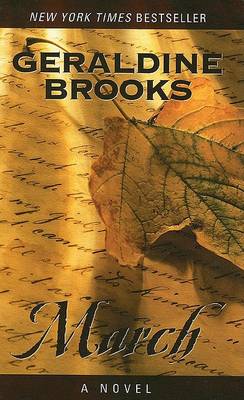
From the author of the acclaimed YEAR OF WONDERS, a historical novel and love story set during a time of catastrophe, on the front lines of the American Civil War. Set during the American Civil War, MARCH tells the story of John March, known to us as the father away from his family of girls in LITTLE WOMEN, Louisa May Alcott's classic American novel. In Brooks' telling, March emerges as an abolitionist and idealistic chaplain on the front lines of a war that tests his faith in himself and in the Union cause when he learns that his side, too, is capable of barbarism and racism. As he recovers from a near-fatal illness in a Washington hospital, he must reassemble the shards of his tattered mind and body, and find a way to reconnect with a wife and daughters who have no idea of the ordeals he has been through. As Alcott drew on her real life sisters in shaping the characters of her little women, Brooks turned to the journals and letters of Bronson Alcott, Louisa May's father, an idealistic educator, animal rights exponent and abolitionist who was a friend and confidant of Ralph Waldo Emerson and Henry David Thoreau.
The story spans the vibrant intellectual world of Concord and the sensuous antebellum South, through to the first year of the Civil War as the north reels under a series of unexpected defeats. Like her bestselling YEAR OF WONDERS, MARCH is a love story set in a time of catastrophe. It explores the passions between a man and a woman, the tenderness of parent and child, and the life-changing power of an ardently held belief.
March is the story of the absentee father from Louisa May Alcott's Little Women and at the ripe old age of 39 enlists for the Civil War becoming a Union chaplain and later is assigned to teach free slaves {an oxymoron I know} to read and write. Mr. March, takes center stage in this novel having Marmee and his little women play secondary characters.
March is split in two, half being memories of years gone by, remembering the courting of Marmee, the births of their children and the March's beliefs on slavery, even becoming conductors on the underground railroad. By putting their money where their mouth is, give a large sum of money to a fellow abolitionist to support the cause, but unfortunately the deal goes sour leading to the March's financial decline.
The second part brings us to Mr. March's hellish present while teaching those on a cotton plantation who are willing to read and write he is reminded of Grace, another educated slave that he had an intimate relationship with and the physical humiliation she received when taking the blame for a young slave girl who he was teaching to read and write as well. The tale climaxes at a raid from the Confederates, resulting in murder of black and white by beheading and gunshots and the recapture of freed slaves to be sold back into slavery. Meanwhile, March scrapes by with the grazing of a bullet and soon after returns home to his girls but is still, and forever haunted by the gruesome events he has witnessed.
Reading updates
-
Started reading
-
30 March, 2009:
Finished reading
-
30 March, 2009:
Reviewed
